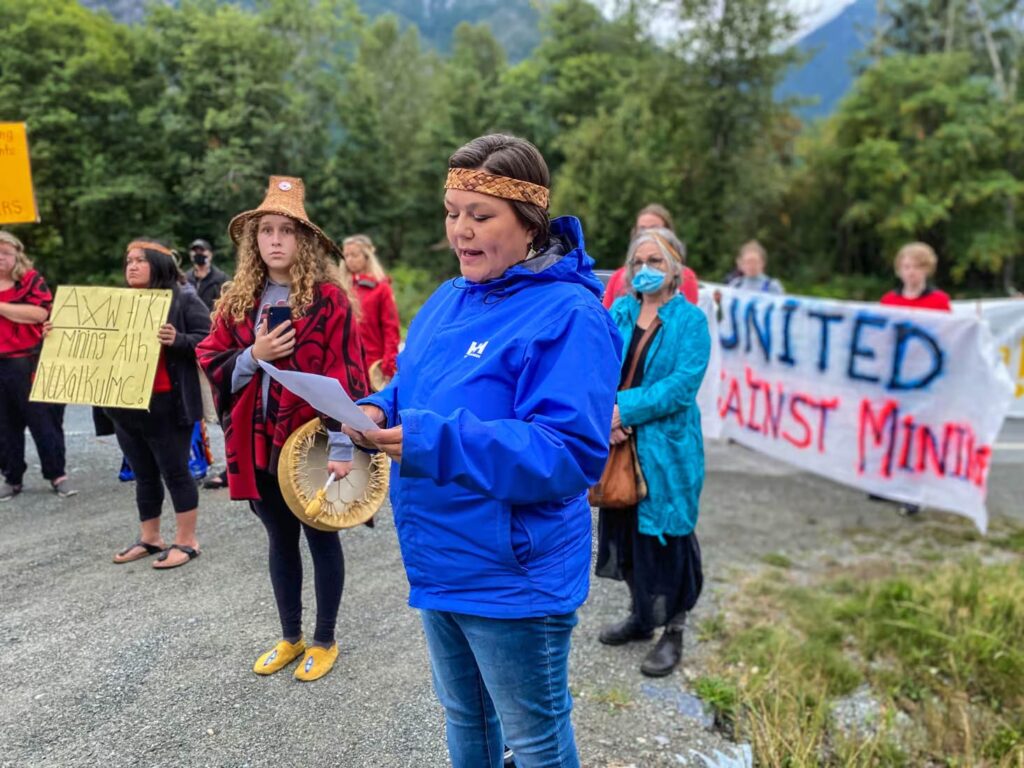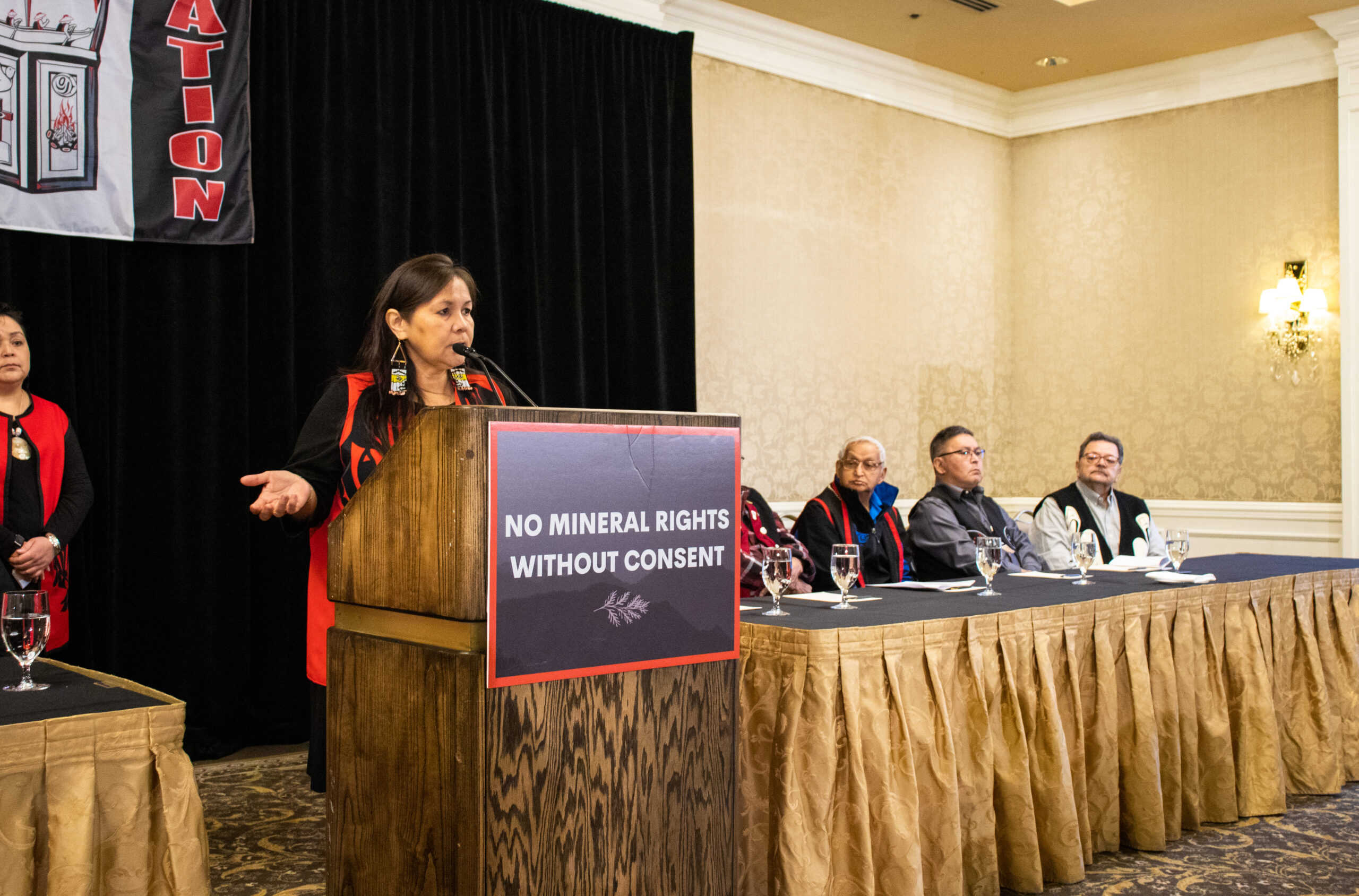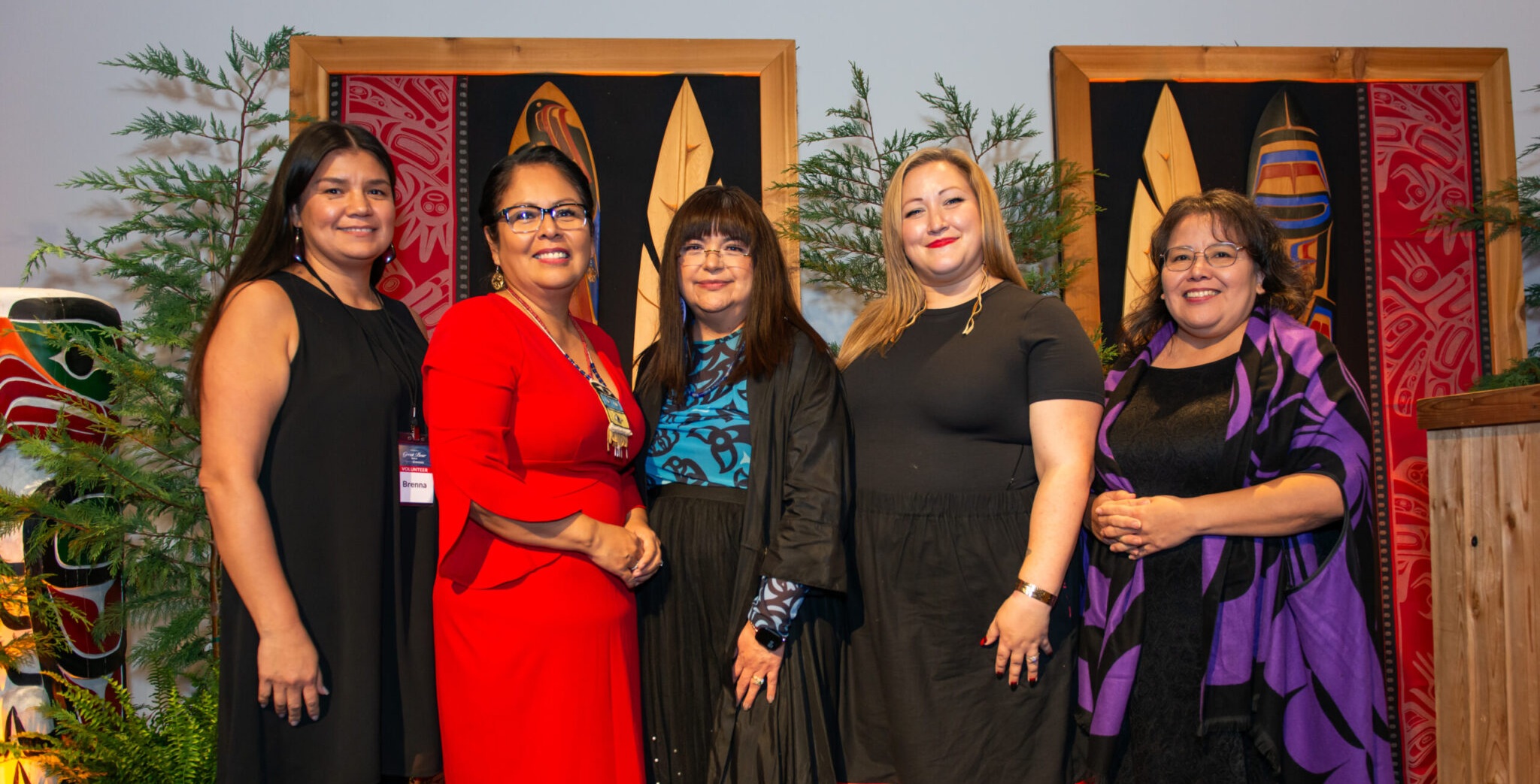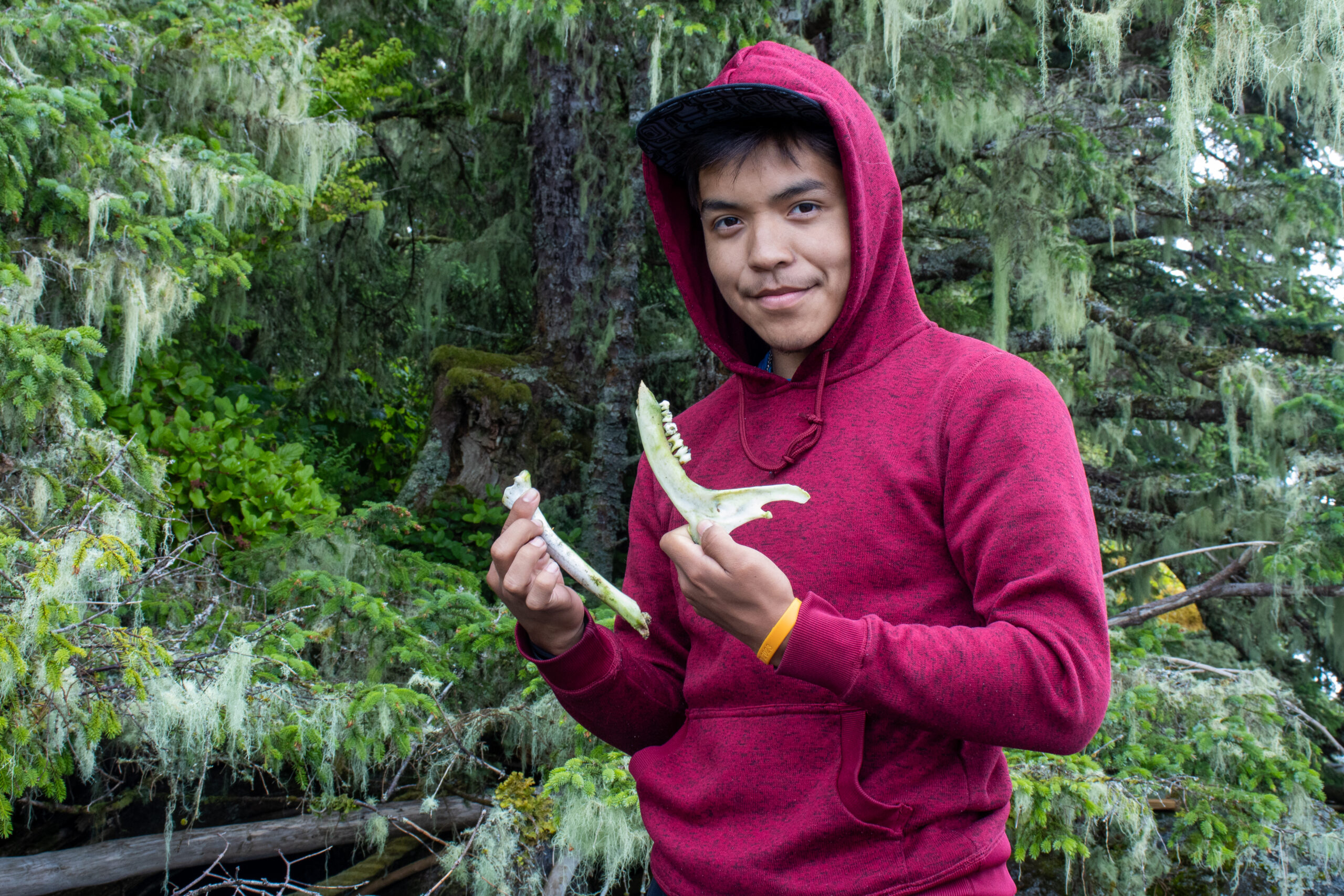Gitxaała’s landmark legal challenge against BC’s “free entry” mineral tenure regime, which grants mineral claims without First Nations’ consultation or consent, is currently underway in the BC Supreme Court.
Intervener arguments included statements from aligned Indigenous Nations, political organizations, mineral exploration companies, and community groups. Several of these groups, representing a wide array of voices calling for mineral tenure reform, shared their voices in a press conference on April 11.
The first speaker, Naxginkw (Tara Marsden), who’s supporting the Gitanyow Hereditary Chiefs in their intervention in the case, thanked the Gitxaała Chiefs for their “tireless efforts to seek justice.” Marsden said their Gitanyow laws, rights and responsibilities guide how her people steward their territories.
“Our ability to do this has been thwarted without free, prior, and informed consent,” Marsden said. “The existence of mineral tenures has created significant barriers and forced us to support legal actions, because we have had no other form of redress to undo these mineral tenures and have meaningful government-to-government land-use planning.”
Marsden acknowledged multiple commitments to the United Nations Declaration on the Rights of Indigenous Peoples (UNDRIP), but says “there are lawyers arguing against this fundamental principle in court.”
The millions of taxpayer dollars that this court case will cost could be going to our detailed land-use planning, and to deciding where and how mineral tenures should be granted in a sustainable manner.”
Nuskmata Jacinda Mack, Mining Spokesperson for the Nuxalk Nation, said her Nation is also “dealing with mining against our consent in our homelands.” In 2021, the Nuxalk people delivered an eviction order to Juggernaut Exploration Limited, whose Crown permits were issued, despite “clear and repeated response that the Nuxalk Nation does not consent to any mining or exploration in their homelands.”
“We have never ceded our sovereignty to Canada. We maintain our bloodline connections, identity and responsibilities as Nuxalk citizens to protect our people, homelands and way of life for future generations. That is our law. Despite our opposition, BC has continued to issue new permits to explore and drill on our mountains.”
Nuskmata said Indigenous Peoples are “aware of our real wealth and will not compromise it for mining.”

‘We need to be a part of the process’
Kukpi7 Justin Kane from the Ts’kw’aylaxw First Nation said his Nation is “not against mining.”
“We’re not against mining, we’ve had mining in our community since the 70s. It has created revenues for our people, jobs for our people,” he said. “What we’re concerned with is the process of mining and how it’s done, how the permits are being applied for and given without consent.”
Chief Kane said he has been made aware of people applying for permits for mining and exploration activities in his territory, without having ever sent a letter, “come to the table,” or had any discussions about potential mining that could happen. “We need to be a part of the process and ensure our rights, our title, our land and everything within it is appropriately protected.”
Chief Aileen Prince of Nak’azdli First Nation said her Nation has had the same issues in their territory.
“The process being used by the Province is never inclusive, never government-to-government making decisions on territorial lands. We are very much in favour of bringing the Province up to date in keeping of their own laws,” she said. “As stewards of our territory within our system, we take it very seriously when decisions are being made at tables that don’t include us.”
Jamie Kneen from Mining Watch Canada/Co-Chair of the BC Mining Law Reform Network said the issue of “mining’s privileged access to land,” the principle of “free-entry” mining, and the belief that “mining is the highest and best use of land” has been a central preoccupation for his organization and partners for over two decades.
“It has been a violation of the authority of Indigenous Nations since the Gold Rush era as an expression of colonial contempt for that authority,” Kneen said. “Mining is not the highest and best use of land. It is a valid use of land, but it must be considered as only one use of land that may in fact be better dedicated to other land uses, whether that is cultural use, harvesting, or conservation.”
While the BC government has promised to update the Mineral Tenure Act to meet the standards set out in UNDRIP, Kneen said, “it has taken little action to make that a reality.”
BC’s Mineral Tenure Act is the root cause of a host of problems that disregard Indigenous rights and allows claims to be staked in almost anyone’s backyard, without their knowledge, much less their consent. It exempts claims from land-use planning requirements, ignores the voice of local governments and makes the creation of Protected Areas much more difficult and more expensive.”
Robert Phillips, Political Executive of the First Nations Summit, said it’s important to address this issue immediately and calls on the NDP government to “make the right decision.”
“Shame on the government. Shame on industry. This has to stop. The Liberals started this and the NDP has to end it. Premier David Eby has to be put on notice to make sure this stops.”
Phillips said, as a part of the First Nations Summit, he engages around Treaty negotiations, Treaty agreements, and “other constructive arrangements.”
“Canada negotiates with First Nations, because they are Nations. We’ve been here since time immemorial and we’ve governed the lands and waters for thousands and thousands of years. We have self-determination, we have self-government. We have our own laws, languages, cultures… and now we have to make sure that when it comes to the co-development of laws and legislation, the government is doing so with the UN Declaration implemented.”
‘Archaic, repugnant, colonial system of accessing mineral claims in Indigenous territories’
The case is the first to substantively interpret BC’s legal obligations under the Declaration on the Rights of Indigenous Peoples Act (DRIPA). B.C.’s Human Rights Commissioner Kasari Govender said the Declaration Act is a “human rights law, like any other piece of human rights legislation” which must take primacy over “ordinary statutes like the Mineral Tenure Act.” How DRIPA is interpreted and implemented in this case will have “important implications for reconciliation” across the province.
Grand Chief Stewart Phillip, President of the Union of BC Indian Chiefs, said it’s an honour to stand with the Gitxaała Nation and their allies in challenging the “archaic, repugnant, colonial” system of accessing mineral claims in Indigenous territories.
“There are people huddled over their keyboards in dark basements filing claims to vast amounts of our territories, which we hold title to and which are covered since time immemorial by our laws, our practices of stewardship and sustainability,” Chief Stewart Phillip said.
Mining is not the best use of land, it’s the most destructive use of land. The Province is littered with abandoned tailings ponds, old mining works that are contaminating our water systems and jeopardizing our salmon.”
Chief Phillip said litigation is one tool that First Nations have used for “a very long time now.” It’s time that the government embraces DRIPA and that corporations and companies seek “free, prior and informed consent” from First Nations.
“It’s a very simple thing to happen and it needs to happen now,” he said. “We can’t just simply stand on the sidelines and watch our territories be destroyed. I want to applaud the Elders, the Knowledge Keepers, the people of the land that have stood up and say ‘enough is enough.’”
The proceedings are going ahead by way of judicial review, currently in a two-week hearing. Gitxaała’s lawyers have presented their case and the Ehattesaht First Nation’s case will finish today, April 11, followed by the interveners. Jessica Clogg, director and senior counsel at West Coast Environmental Law and a member of Gitxaała’s legal team, said they anticipate that case will require more time, “potentially up to six months.” Clogg said that if the Nation is successful in its challenge, “we will begin to see the end of the archaic practice of granting mineral claims without consultation or consent.”


